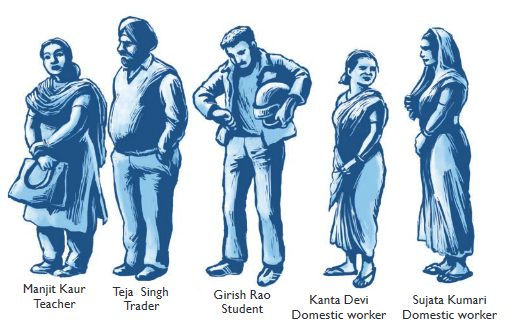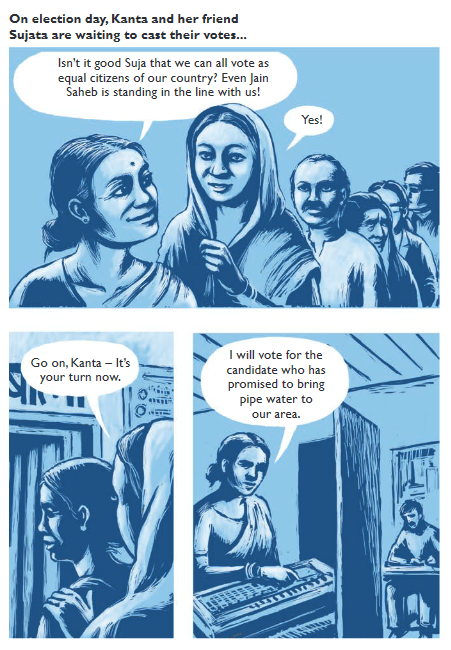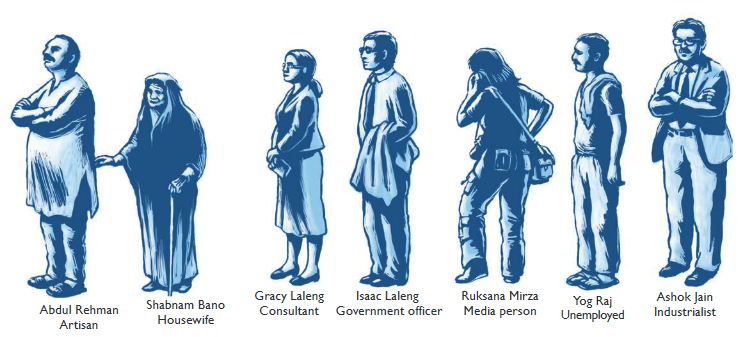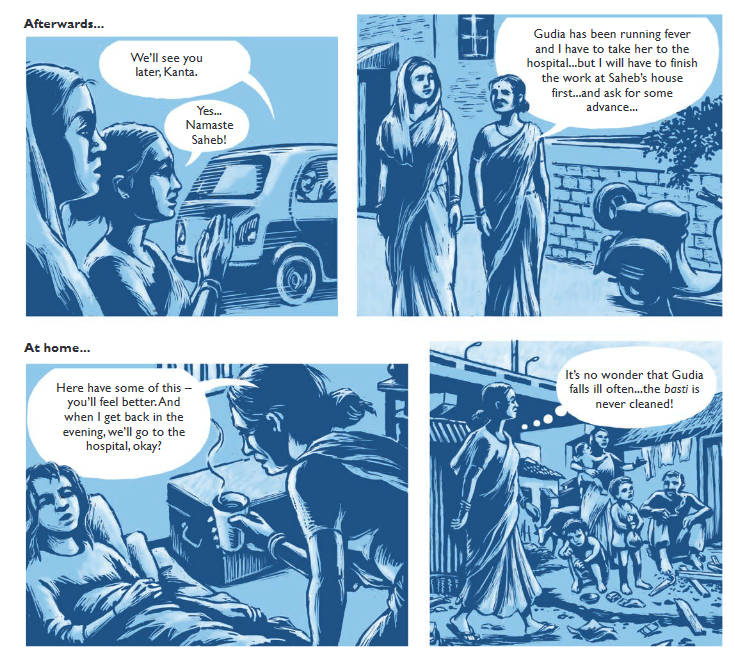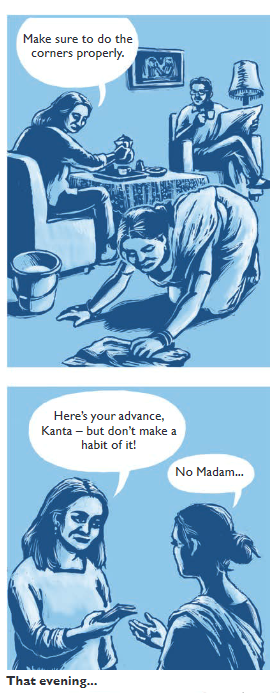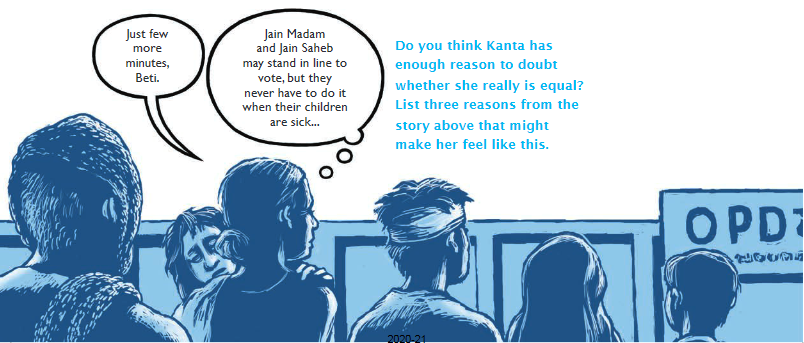Table of Contents
UNIT ONE
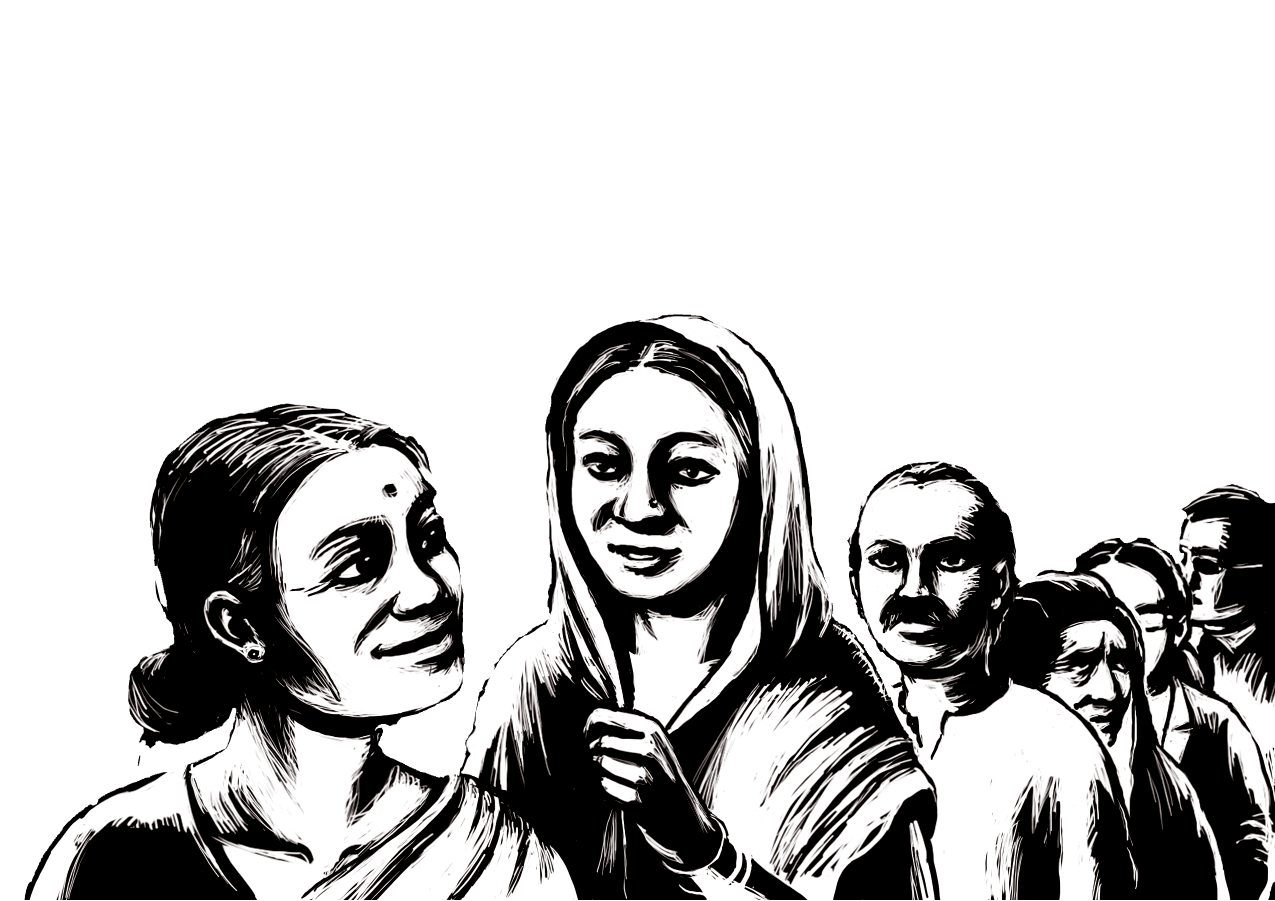
Equality in Indian Democracy
Teacher’s note
This Unit introduces the learner to the critical role of equality in democracy, with specific reference to India. The Constitution of India guarantees equality to all citizens. Despite this, the daily lives of people in India are far from equal. Earlier discussions on equality in Civics textbooks most often reiterated certain provisions of the Constitution without adequately considering the reality of these in people’s lives. This Unit adopts a different approach. It discusses the need for equality through highlighting the inequalities that continue to be practised and experienced by various communities.
The first chapter introduces the learner to Kanta, Omprakash Valmiki and the Ansaris, all of whom experience inequality in different ways. It is through their experiences that we introduce the concept of dignity. The government’s role in passing laws and instituting policies is discussed to show that commitment to the alleviation of existing inequalities is a major part of the work that governments undertake. The chapter also briefly introduces an issue of inequality in the United States of America to highlight that this is a global phenomenon and a feature of many democratic countries.
The second chapter of this Unit is Chapter 9 of this book. It ties together the main ideas on equality raised throughout the text. A significant portion of the last chapter is devoted to discussing people’s contribution to the fight for equality.
This is achieved through focusing on one social movement as well as highlighting creative (writings, songs, poems) ways through which people express their demands for equality.
Both chapters aim to help the learner understand that equality and democracy are dynamic and not static concepts. This dynamism is reflected in the government’s passing of new laws and programmes, and in people’s movements around various social and economic issues.
Kanta, Omprakash, the Ansaris, and the Tawa Matsya Sangh all have diverse local equivalents. Local situations should be used as a practical reference to make the discussion on underlying concepts more relevant and appropriate. A discussion on equality in the classroom requires empathy as well as a firm commitment on the teacher’s part to ensuring that the dignity of all learners be respected.

CHAPTER 1
Equality in Indian Democracy
On Equality
India is a democracy. In the Class VI book, we looked at the key elements of a democratic government. These include people’s participation, the resolution of conflict, and equality and justice. Equality is a key feature of democracy and influences all aspects of its functioning. In this chapter you will read more about equality – what it is, why it is important in a democracy, and whether or not everyone is equal in India. Let’s begin by looking at Kanta’s story.
Equal right to vote
The story above begins with Kanta standing in line to cast her vote. Look again at the various people who are standing in line with her. Kanta recognises her employer, Ashok Jain and Chotte Lal, her neighbour. In a democratic country, like India, all adults irrespective of what religion they belong to, how much education they have had, what caste they are, or whether they are rich or poor are allowed to vote. This, as you have already read in the Class VI book, is called universal adult franchise and is an essential aspect of all democracies. The idea of universal adult franchise is based on the idea of equality because it states that every adult in a country, irrespective of their wealth and the communities she/he belongs to, has one vote. Kanta is excited to vote and happy that she is equal to all of the others because each of them has one vote.
But as her day goes on, Kanta becomes less certain about what this equality really means.
What is it that makes Kanta unsure? Let’s take a look at a day in her life. She lives in a slum and has a drain behind her house. Her daughter is sick but she cannot take the day off from work because she needs to borrow money from her employers to take her child to the doctor. Her job as a domestic help tires her out, and finally she ends her day by again standing in a long line. This line, in front of the government hospital, is unlike the one in the morning because most of the people standing in it are poor.
Other kinds of equality
Kanta is one of many people who live in democratic India and who have the right to vote but whose daily living and working conditions are far from equal. Apart from being poor, people in India experience inequality in different ways. Let us see what this means by reading the two stories given below. Each of these is based on real incidents in people’s lives and reflects the different kinds of inequalities that exist in India.
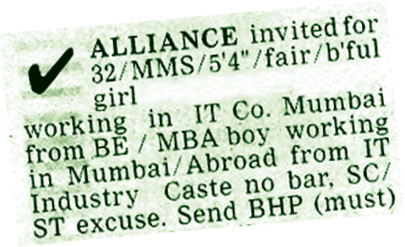


Circle the reference to caste in the matrimonial advertisements given above.
One of the more common forms of inequality in India is the caste system. If you live in rural India your caste identity is something that you probably learned or experienced very young. If you live in urban India some of you might think that people no longer believe in caste. But just look at these matrimonials shown from a leading English newspaper and you will see how important the issue of caste continues to be in the minds of highly educated urban Indians.
Now let us read a story about the experiences of a Dalit child attending school. You have already read about Dalits in the Class VI book. Dalit is a term that the so-called lower castes use to address themselves. Dalit means ‘broken’ and by using this word, lower castes are pointing to how they were, and continue to be, seriously discriminated against.
Omprakash Valmiki (1950–2013) is a famous Dalit writer. In his autobiography, Joothan, he writes, “I had to sit away from the others in the class, and that too on the floor. The mat ran out before reaching the spot I sat on. Sometimes I would have to sit way behind everybody, right near the door…sometimes they would beat me without any reason.” When he was in Class IV, the headmaster asked Omprakash to sweep the school and the playground. He writes, “The playground was way larger than my small physique could handle and in cleaning it, my back began to ache. My face was covered with dust. Dust had gone inside my mouth. The other children in my class were studying and I was sweeping. Headmaster was sitting in his room and watching me. I was not even allowed to get a drink of water. I swept the whole day,…From the doors and windows of the school rooms, the eyes of the teachers and the boys saw this spectacle.” Omprakash was made to sweep the school and the playground for the next couple of days and this only came to an end when his father, who happened to be passing by, saw his son
sweeping. He confronted the teachers and then walking away from the school holding Omprakash’s hand, he said loudly for all of them to hear, “You are a teacher…So I am leaving now. But remember this much Master…(He) will study right here…in this school. And not just him, but there will be more coming after him.”
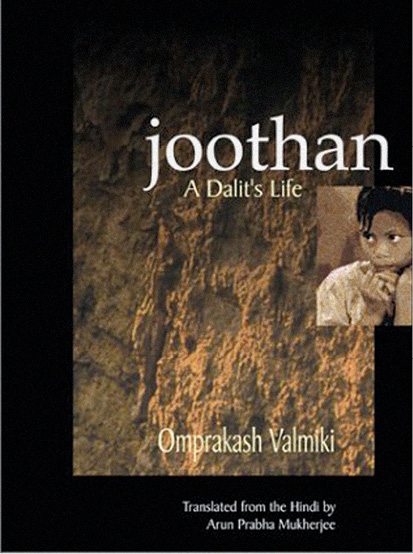
Cover of Omprakash Valmiki’s book, Joothan, which talks about his experiences of growing up as a Dalit boy.
Why do you think Omprakash Valmiki was being treated unequally by his teacher and his classmates? Imagine yourself as Omprakash Valmiki and write four lines about how you would feel if you were in the same situation as him.
Why do you think the Ansaris were being treated unequally? What would you do if you were in the Ansaris’ position and could not find a place to live because some people did not want to live next to you because of the religion you practice?
The second story is based on an incident that took place in one of India’s larger cities and is common practice in most parts of the country. It is a story about Mr and Mrs Ansari who were looking to rent an apartment in the city. They had the money and so paying the rent was no problem. They went to a property dealer for help to find a place. The dealer informed them that he knew about quite a few apartments that were available for rent. They visited the first apartment and the Ansaris liked it very much and decided to take it. However, when the landlady found out their names, she made an excuse about how she could not rent the house to someone who ate meat because the building did not have any non-vegetarian residents. Both the Ansaris and the property dealer were surprised to hear this because they could smell fish being cooked in the neighbour’s house. The same excuse was repeated in the second and the third apartments. Finally, the property dealer told them that they might want to change their names and call themselves Mr and Mrs Kumar. The Ansaris were reluctant to do this and decided to look some more. In the end, it took a whole month of looking at apartments before they found a landlady who was willing to give them a place on rent.
Recognising dignity
You have understood by now that the caste we are born into, the religion we practice, the class background we come from, whether we are male or female – these are often the things that determine why some people are treated unequally. Omprakash Valmiki and the Ansaris are being treated unequally on the basis of differences of caste and religion.
If you were one of the Ansaris how would you have responded to the suggestion that you change your name?
Can you think of an incident in your life in which your dignity was violated? How did this make you feel?
When persons are treated unequally, their dignity is violated. The dignity of both Omprakash Valmiki and the Ansaris was violated because of the way in which they were treated. By picking on him and making him sweep the school, because of his caste, Omprakash Valmiki’s schoolmates and teachers hurt his dignity badly and made him feel as if he was less than equal to all other students in the school. Being a child, Omprakash Valmiki could do very little about the situation that he was in. It was his father who, on seeing his son sweep, felt angry by this unequal treatment and confronted the teachers. The Ansaris’ dignity was also hurt when persons refused to lease their apartments to them. However, when the property dealer suggested that they change their name, it was their dignity or self-respect that made them refuse this suggestion.
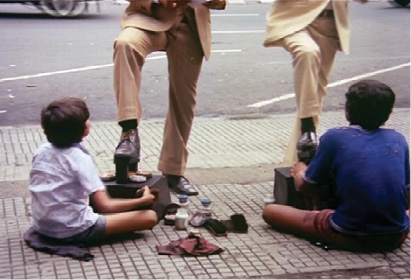
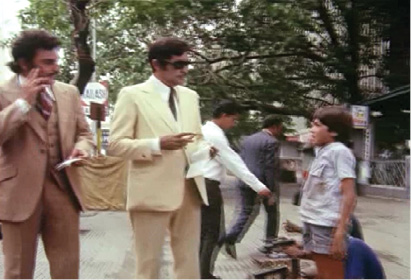

In the 1975 film, Deewar, a boy who works as a shoeshine refuses to pick up a coin thrown at him. He feels that there is dignity in the work that he does and insists that his fee be given respectfully.
Omprakash and the Ansaris do not deserve to be treated like this. They deserve the same respect and dignity as anyone else.
Equality in Indian democracy
The Indian Constitution recognises every person as equal. This means that every individual in the country, including male and female persons from all castes, religions, tribes, educational and economic backgrounds are recognised as equal. This is not to say that inequality ceases to exist. It doesn’t. But atleast, in democratic India, the principle of the equality of all persons is recognised. While earlier no law existed to protect people from discrimination and ill-treatment, now there are several that work to see that people are treated with dignity and as equals.
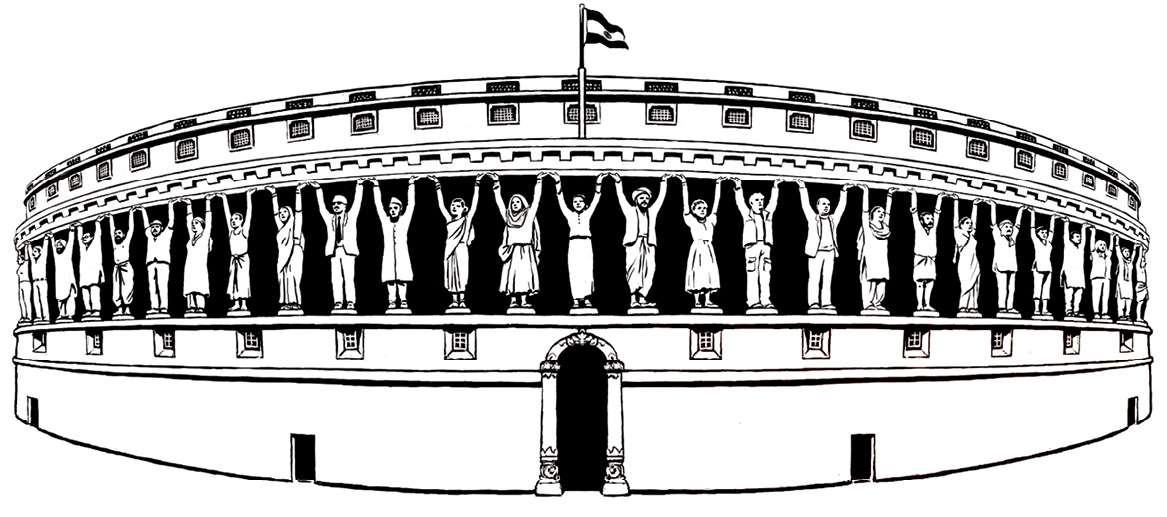
The Parliament is the cornerstone of our democracy and we are represented in it through our elected representatives.
This recognition of equality includes some of the following provisions in the Constitution: first that every person is equal before the law. What this means is that every person, from the President of the country to Kanta, a domestic worker, has to obey the same laws. Second, no person can be discriminated against on the basis of their religion, race, caste, place of birth or whether they are female or male. Third, every person has access to all public places including playgrounds, hotels, shops and markets. All persons can use publicly available wells, roads and bathing ghats. Fourth, untouchability has been abolished.
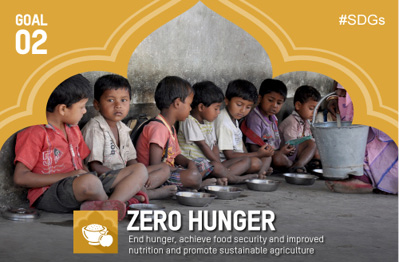
Sustainable Development Goal (SDG) www.in.undp.org
The two ways in which the government has tried to implement the equality that is guaranteed in the Constitution is first through laws and second through government programmes or schemes to help disadvantaged communities. There are several laws in India that protect every person’s right to be treated equally. In addition to laws, the government has also set up several schemes to improve the lives of communities and individuals who have been treated unequally for several centuries. These schemes are to ensure greater opportunity for people who have not had this in the past.
One of the steps taken by the government includes the midday meal scheme. This refers to the programme introduced in all government elementary schools to provide children with cooked lunch. Tamil Nadu was the first state in India to introduce this scheme, and in 2001, the Supreme Court asked all state governments to begin this programme in their schools within six months. This programme has had many positive effects. These include the fact that more poor children have begun enrolling and regularly attending school. Teachers reported that earlier children would often go home for lunch and then not return to school but now with the midday meal being provided in school, their attendance has improved. Their mothers, who earlier had to interrupt their work to feed their children at home during the day, now no longer need to do so. This programme has also helped reduce caste prejudices because children of all castes in the school eat this meal together, and in quite a few places, Dalit women have been employed to cook the meal. The midday meal programme also helps reduce the hunger of poor students who often come to school and cannot concentrate because their stomachs are empty.
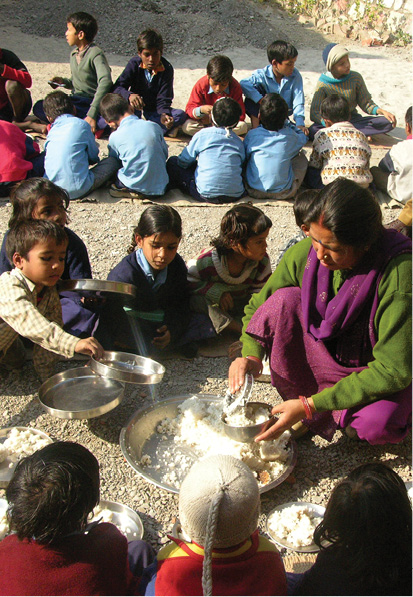
Children being served their midday meal at a government school in Uttarakhand.
What is the midday meal programme? Can you list three benefits of the programme? How do you think this programme might help promote greater equality?
Find out about one government scheme in your area. What does this scheme do? Whom is this scheme set up to benefit?
While government programmes play an important role in increasing equality of opportunity, there is much that still needs to be done. While the midday meal programme has helped increase the enrolment and attendance of poor children in school, there continues to be big differences in our country between schools that the rich attend and those that the poor attend. Even today there are several schools in the country in which Dalit children, like Omprakash Valmiki, are discriminated against and treated unequally. These children are forced into unequal situations in which their dignity is not respected. This is because people refuse to think of them as equal even though the law requires it.
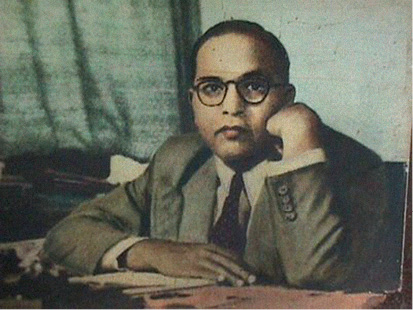
“It is disgraceful to live at the cost of one’s self-respect. Self-respect is the most vital factor in life. Without it, man is a cipher. To live worthily with self-respect, one has to overcome difficulties. It is out of hard and ceaseless struggle alone that one derives strength, confidence and recognition.
“Man is mortal. Everyone has to die some day or the other. But one must resolve to lay down one’s life in enriching the noble ideals of self-respect and in bettering one’s human life... Nothing is more disgraceful for a brave man than to live life devoid of self-respect.”
– B.R. Ambedkar
One of the main reasons for this is that attitudes change very slowly. Even though persons are aware that discrimination is against the law, they continue to treat people unequally on the basis of their caste, religion, disability, economic status and because they are women. It is only when people begin to believe that no one is inferior, and that every person deserves to be treated with dignity, that present attitudes can change. Establishing equality in a democratic society is a continuous struggle and one in which individuals as well as various communities in India contribute to and you will read more about this in this book.
Issues of equality in other democracies
You are probably wondering whether India is the only democratic country in which there is inequality and where the struggle for equality continues to exist. The truth is that in many democratic countries around the world, the issue of equality continues to be the key issue around which communities struggle. So, for example, in the United States of America, the African–Americans whose ancestors were the slaves who were brought over from Africa, continue to describe their lives today as largely unequal. This, despite the fact that there was a movement in the late 1950s to push for equal rights for African–Americans. Prior to this, African–Americans were treated extremely unequally in the United States and denied equality through law. For example, when travelling by bus, they either had to sit at the back of the bus or get up from their seat whenever a white person wished to sit.
Rosa Parks (1913–2005) was an African–American woman. Tired from a long day at work she refused to give up her seat on a bus to a white man on 1 December 1955. Her refusal that day started a huge agitation against the unequal ways in which African–Americans were treated and which came to be known as the Civil Rights Movement. The Civil Rights Act of 1964 prohibited discrimination on the basis of race, religion or national origin. It also stated that all schools would be open to African–American children and that they would no longer have to attend separate schools specially set up for them. However, despite this, a majority of African–Americans continue to be among the poorest in the country. Most African-American children can only afford to attend government schools that have fewer facilities and poorly qualified teachers as compared to white students who either go to private schools or live in areas where the government schools are as highly rated as private schools.
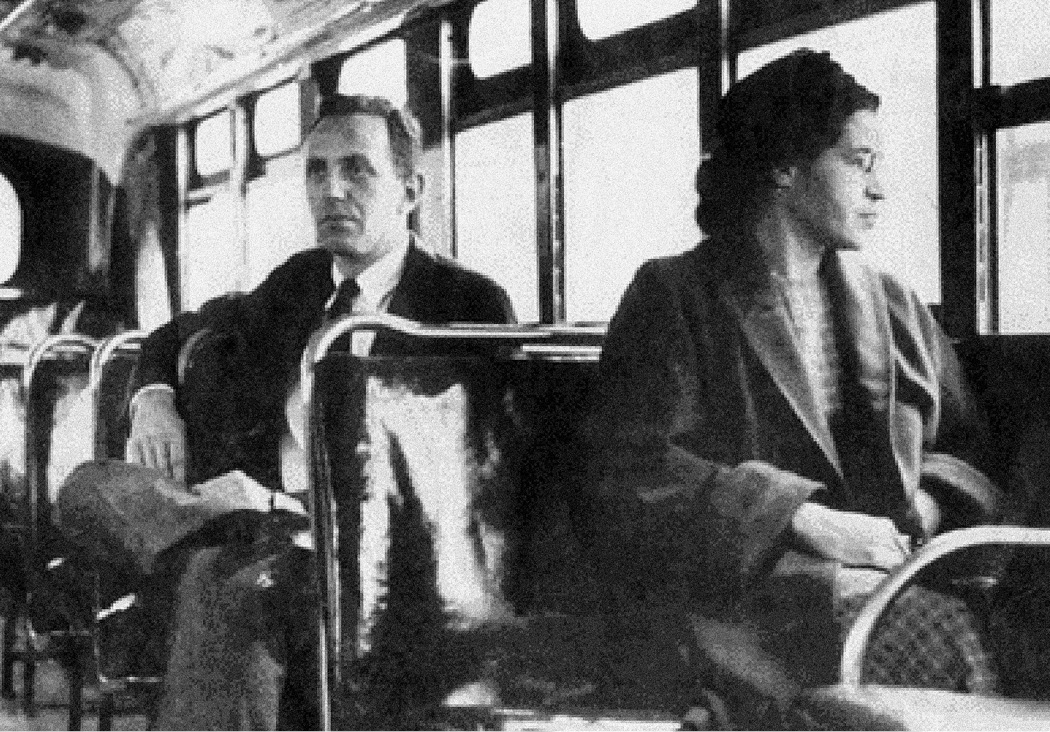
Rosa Parks, an African–American woman, changed the course of American history with one defiant act.
Excerpt from Article 15 of the Indian Constitution
Prohibition of discrimination on grounds of religion, race, caste, sex or place of birth.
(1) The State shall not discriminate against any citizen on grounds only of religion, race, caste, sex, place of birth or any of them.
(2) No citizen shall, on grounds only of religion, race, caste, sex, place of birth or any of them, be subject to any disability, liability, restriction or condition with regard to –
(a) access to shops, public restaurants, hotels and places of public entertainment;
or
(b) the use of wells, tanks, bathing ghats, roads and places of public resort maintained wholly or partly out of State funds or dedicated to the use of the general public.
Challenge of democracy
No country can be described as being completely democratic. There are always communities and individuals trying to expand the idea of democracy and push for a greater recognition of equality on existing as well as new issues. Central to this is the struggle for the recognition of all persons as equal and for their dignity to be maintained. In this book you will read about how this issue of equality affects various aspects of our daily lives in democratic India. As you read these chapters, think about whether the equality of all persons and their being able to maintain their dignity is upheld.
EXERCISES
1. In a democracy why is universal adult franchise important?
2. Re-read the box on Article 15 and state two ways in which this Article addresses inequality?
3. In what ways was Omprakash Valmiki’s experience similar to that of the Ansaris?
4. What do you understand by the term “all persons are equal before the law”? Why do you think it is important in a democracy?
5. According to the Rights of Persons with Disabilities Act, 2016, persons with disabilities have equal rights, and that the government should make possible their full participation in society. The government has to provide free education and integrate children with disabilities into mainstream schools. This law also states that all public places including buildings, schools, etc., should be accessible and provided with ramps.
Look at the photograph and think about the boy who is being carried down the stairs. Do you think the above law is being implemented in his case? What needs to be done to make the building more accessible for him? How would his being carried down the stairs affect his dignity as well as his safety?
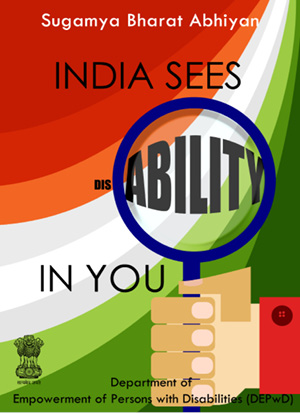
http://disabilityaffairs.gov.in
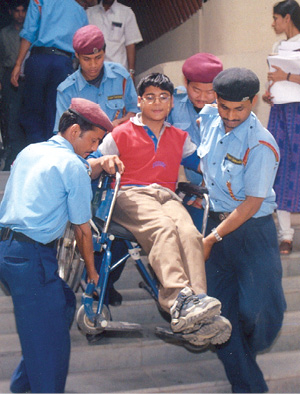
Glossary
Universal adult franchise: This is a very important aspect of democratic societies. It means that all adult (those who are 18 and above) citizens have the right to vote irrespective of their social or economic backgrounds.
Dignity: This refers to thinking of oneself and other persons as worthy of respect.
Constitution: This is a document that lays down the basic rules and regulations for people and the government in the country to follow.
Civil Rights Movement: A movement that began in USA in 1950s in which African–American people demanded equal rights and an end to racial discrimination.
